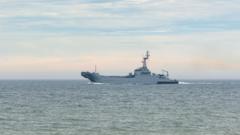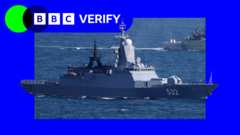NATO has launched the "Baltic Sentry" mission to bolster the security of vital undersea cables in the Baltic Sea, amid growing concerns over potential sabotage linked to an uptick in unexplained damage to infrastructure in the region.
NATO Boosts Baltic Security Amid Rising Concerns Over Undersea Cable Safety

NATO Boosts Baltic Security Amid Rising Concerns Over Undersea Cable Safety
NATO's new operation aims to enhance surveillance and protect critical underwater infrastructure in response to recent disruptions.
NATO has officially initiated a mission called “Baltic Sentry” to increase surveillance and protect crucial undersea cables in the Baltic Sea following a series of incidents in which these cables were damaged or severed. The announcement was made by NATO Secretary-General Mark Rutte during a summit in Helsinki, attended by representatives from all NATO member nations bordering the Baltic: Finland, Estonia, Denmark, Germany, Latvia, Lithuania, Poland, and Sweden.
While Russia was not explicitly named as responsible for the cable damage, Rutte highlighted the need for an increased vigilance regarding Moscow’s “shadow fleet” – a term for suspicious ships lacking clear ownership that are suspected of transporting embargoed oil products. Since Russia's full-scale invasion of Ukraine in February 2022, relations between NATO member countries and Russia have been escalating, prompting concerns for regional security.
"There is reason for grave concern" regarding the integrity of infrastructure, Rutte stated. He explained that NATO aims to adopt a robust approach to incidents, which may include boarding suspect vessels and potentially seizing them if necessary. Specific details regarding the deployment of military assets for the Baltic Sentry operation were withheld, as Rutte indicated that strategic adjustments could occur, reflecting the dynamic security environment.
Undersea cables play a pivotal role in our global infrastructure, facilitating not only electricity supply but also accounting for over 95% of international internet traffic. In total, 1.3 million kilometers (approximately 800,000 miles) of cables support about $10 trillion in financial transactions daily.
A series of unexplained incidents have raised alarms about the safety of undersea services in the Baltic region. The latest incident involved an electricity cable connecting Finland and Estonia, which was cut late last December. When authorities intervened, they found an oil tanker, Eagle S – registered under the Cook Islands flag – was implicated, as it threatened to sever additional power and gas lines.
Officials from Estonia and Finland have expressed concerns over the frequency of such events. Estonian Foreign Minister Margus Tsahkna remarked that the increasing occurrences of damage to submarine infrastructure raise doubts about their accidental nature. Finnish Prime Minister Ulf Kristersson echoed these sentiments, suggesting a need for cautious investigation without jumping to conclusions but affirming that hostile intentions remain a possibility.
NATO’s proactive action through the Baltic Sentry mission underscores the alliance's commitment to safeguarding the security of its member nations and their fundamental infrastructure in an increasingly tense geopolitical landscape.























